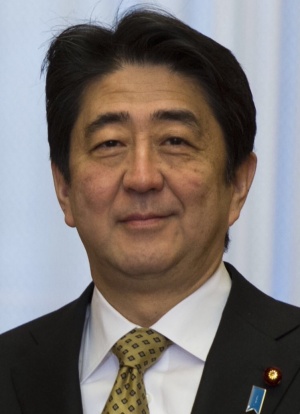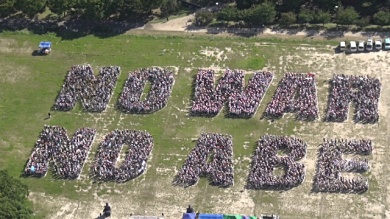Difference between revisions of "Shinzō Abe"
(fix job) |
(Job data addition: Prime Minister of Japan (end).) |
||
| Line 12: | Line 12: | ||
|title=Prime Minister of Japan | |title=Prime Minister of Japan | ||
|start=26 December 2012 | |start=26 December 2012 | ||
| − | |end= | + | |end=26 September 2007 |
}}{{job | }}{{job | ||
|title=Prime Minister of Japan | |title=Prime Minister of Japan | ||
Revision as of 17:07, 28 September 2016
 | ||||||||||||||||||||||||||||||
| Born | 安倍晋三 1954-09-21 Tokyo, Japan | |||||||||||||||||||||||||||||
| Alma mater | University of Southern California, Bunmei Ibuki | |||||||||||||||||||||||||||||
| Religion | Shinto | |||||||||||||||||||||||||||||
| Spouse | Akie Matsuzaki | |||||||||||||||||||||||||||||
| Party | Liberal Democratic Party | |||||||||||||||||||||||||||||
| ||||||||||||||||||||||||||||||
Contents
Career
Shinzō Abe "spent considerable effort" to facilitate Japan's remilitarization.[1] As with the decision to rebuild the intelligence agencies, this may reflect a success of the deep state in taking effective control over the political leadership of country.
First tenure
Abe became Prime Minister of Japan on 26 September 2006. He announced a new cabinet on August 27, 2007. However, the new agricultural minister Takehiko Endo, involved in a finance scandal, resigned only 7 days later. On September 12, 2007, only three days after a new parliamentary session had begun, Abe announced his intention to resign his position as prime minister at an unscheduled press conference.[2][3] Abe said his unpopularity was hindering the passage of an anti-terrorism law, involving among other things Japan's continued military presence in Afghanistan. Party officials also said the embattled prime minister was suffering from poor health.[4] On September 26, 2007 Abe officially ended his term as Yasuo Fukuda became the new Prime Minister of Japan.
Second tenure
He became Prime Minister of Japan again on 26 December 2012. In March 2015, he announced a plan to rebuild the Japanese intelligence agencies, using the UK's MI6 as a model. The Intelligence agencies were dismantled by the Allies after World War II.
The Kyodo news agency reported that on 22 April 2015, a drone with traces of radiation was landed on top of Abe's office, carrying a camera and a small bottle with the radioactive symbol. Tests found it was carrying a small amount of radioactive caesium, reported. Abe was in Indonesia at the time, attending an Asian-African conference.[5]
On 24th April, radioactive contamination was discovered in a park in Tokyo.[6]
Appointments by Shinzō Abe
| Appointee | Job | Appointed | End |
|---|---|---|---|
| Fumio Kishida | Japan/Minister of State for Regulatory Reform | 27 August 2007 | 1 August 2008 |
| Fumio Kishida | Japan/Minister/Foreign Affairs | 26 December 2012 | 3 August 2017 |
| Fumio Kishida | Japan/Minister/Defence | 28 July 2017 | 3 August 2017 |
| Fumio Kishida | Japan/Minister of State for Okinawa and the Northern Territories | 27 August 2007 | 1 August 2008 |
| Fumio Kishida | Japan/Minister of State for Science Technology and Quality of Life | 27 August 2007 | 1 August 2008 |
| Kono Taro | Japan/Minister/Foreign Affairs | 3 August 2017 | 11 September 2019 |
| Kono Taro | Chairman of the National Public Safety Commission | 7 October 2015 | 3 August 2016 |
| Kono Taro | Japan/Minister/Defense | 11 September 2019 | 16 September 2020 |
Events Participated in
| Event | Start | End | Location(s) | Description |
|---|---|---|---|---|
| WEF/Annual Meeting/2013 | 23 January 2013 | 27 January 2013 | World Economic Forum Switzerland | 2500 mostly unelected leaders met to discuss "leading through adversity" |
| WEF/Annual Meeting/2014 | 22 January 2014 | 25 January 2014 | World Economic Forum Switzerland | 2604 guests in Davos considered "Reshaping The World" |
Related Document
| Title | Type | Publication date | Author(s) | Description |
|---|---|---|---|---|
| Document:The Gulf of Credibility | blog post | 14 June 2019 | Craig Murray | That Iran would target a Japanese ship and a friendly Russian crewed ship is a ludicrous allegation |
Rating
As grandson of a WW2 vet, CIA liaison and possible deep state aligned-cult leader, Abe aggressively turned Japan slowly into a possible Ukraine of Asia against China. The fact he also had a very archaic and unapologetic way about the past or its ability to learn from it, perhaps shows the peace in Asia in this century is not a given.
References
- ↑ http://www.theatlantic.com/international/archive/2015/09/japan-pacifism-article-nine/406318/
- ↑ "Embattled Japanese PM stepping down" CBC News. Retrieved September 12, 2007. Archived 17 January 2010 at WebCite
- ↑ "Japanese prime minister resigns" BCB News. Retrieved September 12, 2007. Archived 17 January 2010 at WebCite
- ↑ "Why Did Prime Minister Abe Shinzo Resign? Crippling Diarrhea", JapanProbe.com, January 12, 2008.
- ↑ http://www.bbc.com/news/world-asia-32414843
- ↑ http://www.bbc.com/news/world-asia-32443450
